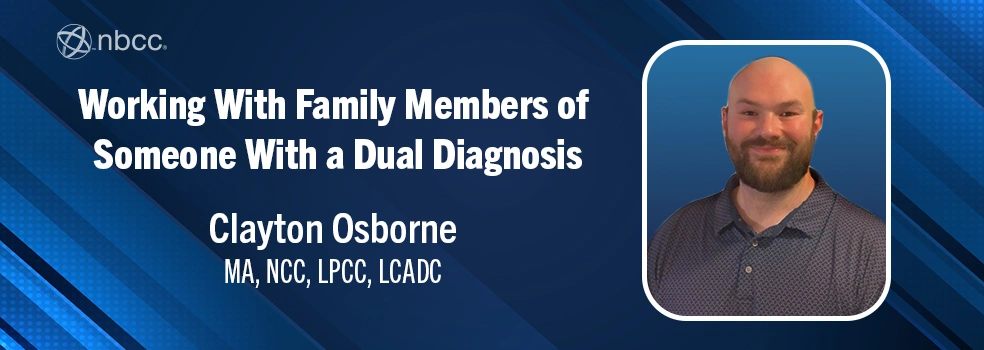
For individuals diagnosed with a co-occurring mental health disorder and substance use disorder (SUD), those closest to them may be their biggest support.
According to the Substance Abuse and Mental Health Services Administration (SAMHSA), family members may be more likely to recognize a loved one’s mood and behavioral changes. This puts them in a unique position of being able to connect the individual with care as well as support them on their healing journey. Family members often attend support groups and/or family counseling as they commit to helping their loved one begin, and stay, on a path to recovery.
However, this can take a toll on the family members' own mental health, too.
Clayton Osborne, MA, NCC, LPCC, LCADC, is a substance abuse counselor at CRS Counseling in Louisville, Kentucky, where dual diagnosis care is at the forefront of their services. Osborne shares his insights in helping family members cope with a loved one’s dual diagnosis.
“In my experience, depression, anxiety, and PTSD co-occur with SUD most. Educating family members on these diagnoses is the first step. It is hard to cope with something if you don’t know what you’re trying to cope with,” says Osborne.
Osborne points out that with addictions, part of this education includes explaining the nuances within choice-based content and disease-based schools of understanding addiction. Conversations surrounding management of expectations of recovery are also important.
Osborne advises to avoid using the word “should,” as he feels it implies that something is the norm.
“Family members may say that their loved one ‘should’ do something. Statements like this place unrealistic expectations on them making a change, and when the desired result isn’t yielded, they may feel shame, failure, or hopelessness,” says Osborne. “Therefore, we want to apply this same rationale in our counseling approach as we seek to reframe their thinking.”
Whenever possible, joint sessions with clients and their family members can be helpful to create a safe space to process the recovery journey for everyone involved.
“I prefer to have the client and family members together so that the opportunity to feel and understand each other’s perspective is present. The client is typically unaware of how their dual diagnosis is affecting their family’s own well-being,” says Osborne.
As a counselor, it is important to consider the family member’s potential role within the client’s addiction story. Genetics aside, the family member may have been a person that enabled or (intentionally or unintentionally) supported the client’s addiction. It is also possible that they are a part of the client’s trauma history.
Osborne brings it back to education. Having honest conversations about how the family member’s social, medical, and mental states may exacerbate their loved one’s condition is tough, but crucial, in helping them cope and their loved one heal, according to Osborne.
Ultimately, Osborne agrees that family members can provide a unique safe haven for a loved one struggling with a dual diagnosis. However, in order to support them most effectively, they must always take care of themselves first.
Osborne offers final advice for counselors serving this population.
“Look at the bigger picture. It’s not just about coping with their loved one’s dual diagnosis. Look at them as a whole person and help them enact changes they can apply to other life challenges that may arise."
Clayton Osborne, MA, NCC, LPCC, LCADC, has been in the mental health field since 2015. During this time, he has gained ample experience working with clients with dual diagnoses, and much of this was completed in underserved rural populations and never served populations. He is currently based in Louisville, Kentucky, and offers intensive outpatient services for people with substance use disorders who also struggle with homelessness.
**Opinions and thoughts expressed in NBCC Visions Newsletter articles belong to the interviewees and do not necessarily reflect the opinions or practices of NBCC and Affiliates.